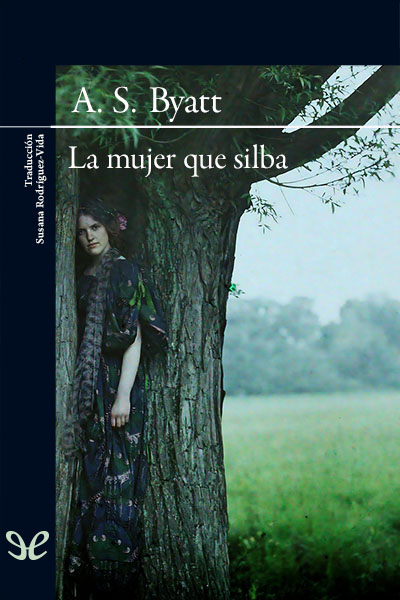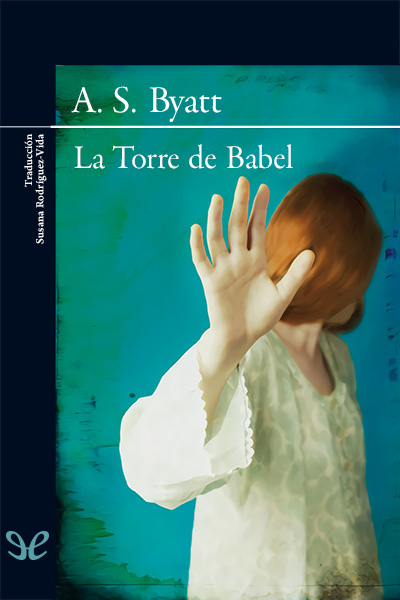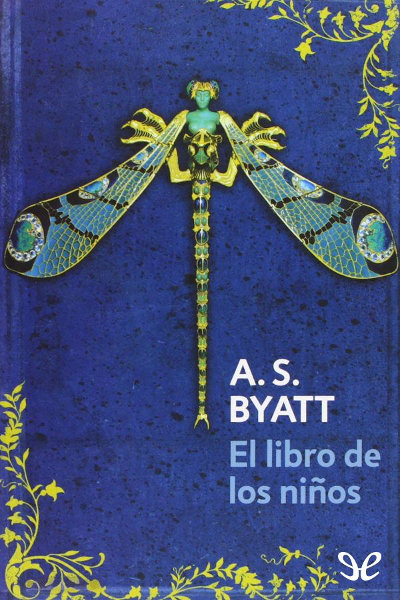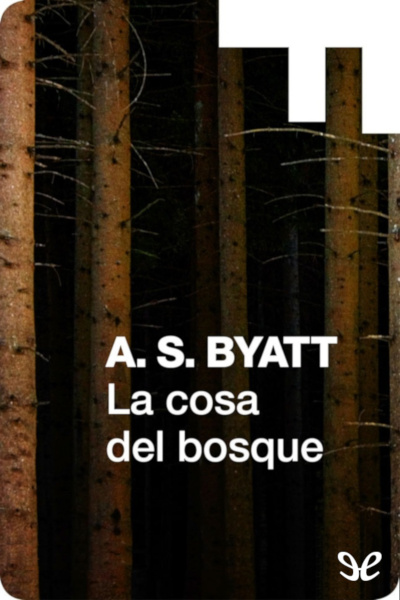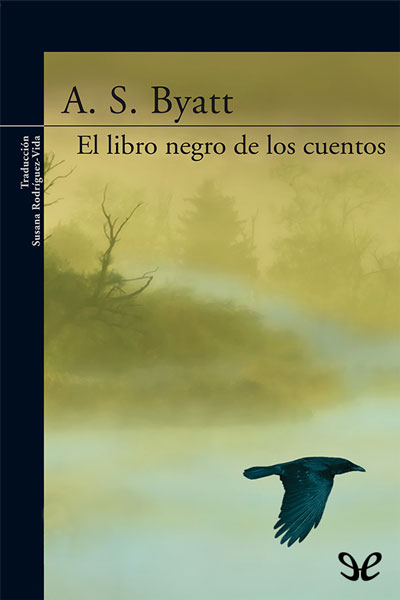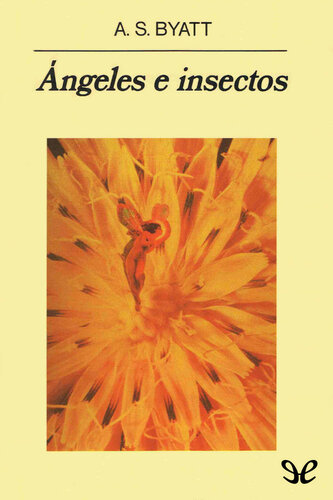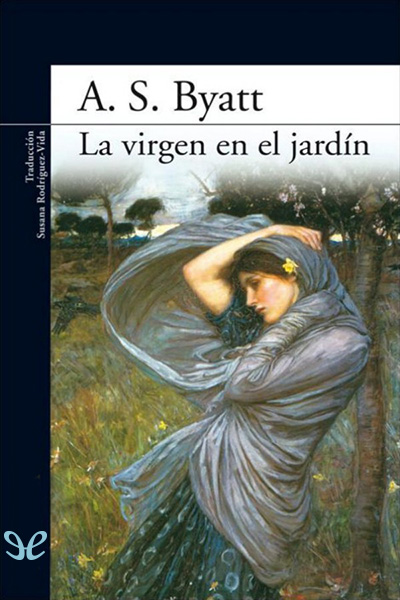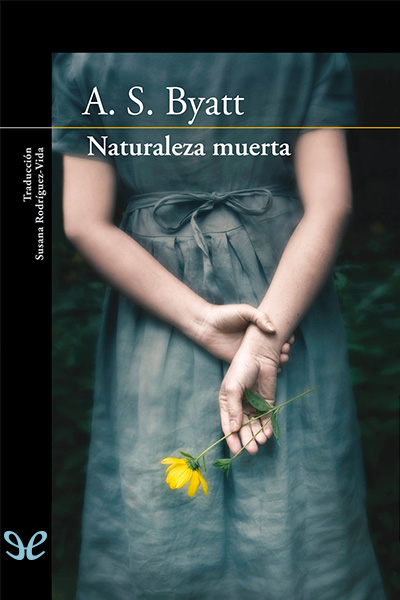oleebook.com
The Shadow of the Sun de A. S. Byatt
de A. S. Byatt - Género: English
Sinopsis
It is the height of summer. After she is expelled from boarding school, Anna Severell returns to the strict, orderly house of her father, a celebrated novelist. The family is soon joined by Oliver Canning, a talented young academic who urges her to take control of her future. As autumn begins and Anna enters university, the pair grow closer. A single mistake, however, could put her newfound independence at risk...
Libros Recomendados - Relacionados
Reseñas Varias sobre este libro
The Shadow of the Sun was the debut novel of A.S. Byatt written when she was an undergraduate at Cambridge between 1954 and 1957 and first published in 1964. As the author states in her Introduction written for publication thirty years later, Byatt wrote the book at the height of the women's movement, ala Betty Friedan's feminine mystique where women were wanting it all, marriage and children and a career.
The Epigraph is key to what A.S. Byatt saw at the core of this book and that was the struggle for seventeen year-old Anna Severell trying to determine how she fits in as the daughter of this renowned and beloved novelist, Henry Severell, who has shadowed Anna's life with his larger-than-life presence. She ultimately goes on to Cambridge but doesn't see the purpose nor does she think that is where she belongs being more interested in mathematics than literature. This is a book about relationships and family dynamics and how each of us must find our own way. This definitely foreshadowed the talented writing that was to come from A.S. Byatt. I loved the book.
"A fortress foil'd which reason did defend,
A siren song, a fever of the mind,
A maze wherein affection finds no end,
A ranging cloud that runs before the wind,
A substance the shadow of the sun,
A goal of grief for which the wisest run.
--- SIR WALTER RALEIGH20 s Rowland Pasaribu376 79
The Shadow of the Sun (originally published as Shadow of a Sun) was A.S. Byatt's first novel, published in 1964 -- but, as she explains in an introduction to the new edition of the book, written (at least the first draft) while she was an undergraduate at Cambridge (1954 to 1957).
The two part tale sends its young heroine, Anna Severell, to Cambridge too -- though with considerably less success than Byatt had. (Her story can also be compared to another Byatt-Cambridge-lass, Frederica Potter in Still Life (see our review).)
Anna is the daughter of the renowned novelist Henry: he's her "distant and largely unknown father", and she does suffer some from being in his shadow. She got herself kicked out of school -- for running away without telling anyone -- but over the course of the novel gets her act together a bit and does finally win a place at Cambridge.
One of the people to give her a push in that direction is Oliver Canning, a summer guest who comes to stay with the Severells with his wife, Margaret. Oliver tutors Anna and helps her along: over the summer it remains a fairly uneasy relationship of sulky girl and well-meaning know-it-all. Matters are complicated by the relationships between the adults: Henry the artist and Oliver as friend and critic; Oliver and his wife, who has to hide the glossy women's magazines she enjoys from her husband because he "believed the reading of such papers to be positively morally wrong", and even Henry and his wife, Caroline.
The first part of the book focusses on the summer this group spends largely together. Oliver and Anna work together much of the time, and eventually it is even suggested that Anna return with him and Margaret to London, as a sort of substitute daughter. That comes to nothing, but much of the book is about Anna's attempt to escape from under her father's shadow -- and from the late-adolescent listless and aimlessness that's taken hold of her at home. Oliver warns that she must get away: she'll just be "a ghost, a shadow" if she remains breathing her "father's rarefied air".
The second part sees Anna at Cambridge, where she still can't find her way. Here matters are complicated when Oliver again appears, and this time their relationship turns into a sexual (and not-quite-romantic) one. Margaret's worries as her marriage collapses without her understanding much of what is going on and the Severell's concerns about their daughter add to the tension -- which culminate in Anna suffering the not too surprising consequences of a sexual relationship and then accepting a marriage proposal. Yes, it does get almost melodramatic there for a while.
The strengths of the novel lie in numerous penetrating, strong scenes. Byatt goes on at some length in analyzing characters and their actions, and much of this she does well. There are also several nicely framed scenes -- a dark and rainy encounter between Anna and Oliver, lost Henry found again, a Cambridge party that doesn't go as hoped for -- though many of these are too obviously staged to fully convince.
The story, too, remains too artificial: a forced novel-plot conceived by someone who has read a good many novels but doesn't have any real material of her own yet. Details ring true, especially about Anna, but the character is forced into circumstances Byatt clearly only imagined -- and at this stage she wasn't novelist enough to get away with relying so much on purely speculative imagination.
The novel plods along, in part, but on the whole is solid and a decent read. Certainly of some interest.
5 s Peter651 99
This was the author's first novel written whilst she was an undergraduate at Cambridge University in the mid-1950s and was first published in 1964.
The novel centres around Anna Severell, the daughter of a renowned but "distant and largely unknown father", novelist. Anna has recently been kicked out of school,for running away without telling anyone, and has returned home unsure what to do with her life next.
Her mother in particular is keen for Anna to go to university so over the course of the summer she is tutored by Oliver Canning, a house guest along with his wife Margaret, in an attempt to get her accepted into Cambridge, efforts which prove successful.
The first part of the book revolves around the summer this group spends largely together. Anna and Oliver have an fairly uneasy relationship, a sulky girl and well-meaning know-it-all teacher. Strained relationships between the adults only add further complications. Oliver and Anna work together much of the time, and it is even suggested that she should move to London to live with him and Margaret. That comes to nothing, but much of the book features Anna's attempt to escape from her adolescent aimlessness and out from under her father's shadow.
In the second part of the book Anna goes to Cambridge, with little change in her listlessness. When Oliver appears again their relationship this time turns sexual with a not unsurprising outcome.
Byatt spends a lot of time analysing characters and their actions and scattered throughout the book there are a few well written scenes. But whilst much of this is well done they also feel so artificially staged that they lack conviction.
IMHO none of the characters are particularly able, this seems especially true of Oliver who seems plain creepy and an ly lover. It is certainly no surprise that he finally succeeds in bedding Anna although quite why she would agree to it is quite another matter. Anna is contrast just reads a stroppy teenager who needs a good kick up the backside.
Ultimately the novel plods along (in particular the first half) and reads what it is. The first novel by a young person who hasn't yet had sufficient life experiences of their own yet but have spent a lot of time studying other author's works. It is solid read with some interest but only really from a standpoint of seeing quite where the author's later more critically acclaimed works stemmed from. PS; Read the foreword afterwards as it gives a lot of the plot away.5 s Moira512 25
Possession is one of my favourite books, and, as I suspect is true for many people, it was the first novel of A.S. Byatt's I ever read. I bounced hard off nearly every single novel of hers I tried after that -- not just earlier ones: this included The Biographer's Tale and A Whistling Woman. Luckily I was quite fond of her short stories, else I might have given up on her for good. (Amusingly, years ago I carefully printed out the new Introduction to this version -- one of the rushed post-P reissues -- not realizing it was in the edition I already had. That is how much I ignored novels of hers that were not-P.) One end-of-summer project is for me to read all of her novels, especially the pre-P books. (I have The Children's Book but am saving it as a special treat, because it is about SO MANY things that I love: Pre-Raphaelites! WWI! Victorian storytelling!) I'm beginning with her first novel. In order to avoid the Possession hangover (I might reread it after I finish these -- it's been a while) I've decided to treat it as if it's in a bubble, and think of these books more as if they were written by Iris Murdoch or Muriel Spark or even Ivy Compton-Burnett and so on. (That reminds me, I really need to read Rosamond Lehmann....) We'll see how it goes.
P. 15 - HA! I just had an actual writing-'ha!'-in-the-margin moment, on page 9: "He looked a cross between God, Alfred Lord Tennyson, and Blake's Job, rsepectable, odd, and powerful all at once." A bit more hopeful, altho Elizabeth's phrasing of 'a D.H. Lawrence book without the sex' almost made me give up before I began. (I did find it interesting that Byatt, according to her own introduction, said it was about 'the paradox of Leavis preaching Lawrence' when they would have hated each other -- does anyone write books that way anymore, so concerned with one author answering another? I it.)
P. 100 - I have, somewhat perversely, perhaps inevitably, entirely characteristically fallen in love with the book -- it's tangled and difficult and knotty! Noone else s it, let alone loves it! You could spend hours trainspotting the literary references in any one chapter! -- but seriously, it's wonderful. I am amazed at critics and other readers who thought the characters were all cardboard, because they are nearly painfully real to me -- Henry the visionary! Caroline the domestic! Margaret the unlucky! And Anna, oh, Anna, she's a little pissy dark version of Ursula Brangwen, how could I not love her. Anna's predicament at first looks entirely singular, the problem of being the child (especially daughter) of a Great Man, but really it is the one Byatt describes in the extremely autobiographical new preface, of being an intellectual woman in the fifties and sixties. Anna can't lose herself in housewifery, whether in self-sacrificial service to a genius her mother or amiable mediocrity with a middle-upper-class (I think) partner, but as everyone keeps telling her, she's not a genius herself either, and she can't be a writer. She is a sitting duck for someone Oliver.
....I can't love Oliver -- as Byatt points out herself, in a novel written by a man he would probably be the hero, even the first-person narrator. Instead he is the villain, and opaque, and I want to blow him up every time he smirks onto the page. -- Anna's problem is also inevitably one of class, whether or not the Genteel Woman should work (as opposed to the working-class women, who had to work to live); I think Oliver is working-class, altho it's hard to tell (I forget whether F.R. Leavis was). The visual descriptions are superb, if occasionally overlong and too elaborate, and Byatt rather works the sun thing to death (at one point I scrawled in the margin 'Henry is Moses I GET IT I GET IT'); there are a (very) few typos and occasionally the author gets tangled up in her commas (she manages to keep a tight rein on the semicolons). But it's extremely well-done, especially for a first novel -- I have a soft spot for those, especially when they're written by favourite authors. It's viewing baby photos.
-- The other thing is there are quite a few funny bits. I don't understand people who say Byatt has no sense of humour. Granted, there are no extended comic scenes, and she has a savage sense of the ridiculous and absurd rather than a genial 'Lord what fools' &c &c vision, but there are two or three nasty little one-line swipes every few pages, someone muttering imprecations under her breath you can just barely overhear. It's fabulously undercutting. -- Anna has mentioned Lawrence and I think he's popped up in the text a few times, but the other great influence on this novel is Hardy; Byatt doesn't mention him at all in the preface, and so far he's mentioned in the narrative barely (Henry's first book was 'a countryman's novel, after Hardy'), but Anna can't help reminding me of all of Hardy's wonderful furious intelligent doomed heroines too.
p. 176 - Alas, hit what looks a fairly bad plot snag -- not too bad, for it to occur this late on in a first novel, and it's a first novelist's mistake, the one of not being able to fully embody the mental processes of someone very different from the writer herself. I'm not convinced Henry would come to Margaret's aid, when he's spent most of his adult life being cosseted by Caroline and has been so very avoidant of everyone else in the book. Perhaps someone pointed this problem out to Byatt, or she felt uneasy about it herself, because there are a few later paragraphs of uneasy reasoning (some of which are along the very unconvincing lines that Henry felt he should do it just because it is so very uncharacteristic. Uh, no). It would be something if Margaret appealed to Henry, or represented something of Anna (as Henry is clearly present in Oliver's attraction to Anna) or even Oliver, both of whom he is far more involved with, but we're repeatedly told in the novel how unappealing she is to him on a number of levels: physical, mental, even aesthetic....D.H. Lawrence was one thing: he loved taking people up, bossing them around, telling them how to live their lives, battering through all their obstacles a huge bearded ram. He lived to be a crusading force for change in not just literature but reality, especially as presented in other individuals.
But Henry's not any kind of proselytizer or prophet and has shut himself off from even his own family completely and deliberately. It could be his hesitant reaching-out to Margaret is something he feels he should do after a lifetime of deliberately avoiding doing just that, but it just isn't presented very well. It feels more a novelist's drawing lines of connection, outside narrative forces intersecting through characters (Anna and Henry, Anna and Oliver, Margaret and Oliver, Margaret and Henry) rather than that narrative being generated naturally through the personalities themselves. I think this is probably what most critics meant when they didn't the characterization and felt the plot was forced; that seems bizarre to me, because these people are very vividly drawn (Caroline and Jeremy least well, but even they still have their three-dimensional moments). But in the kind of social manners plot Byatt finds herself winding up with X and Y have to meet to disturb Z and generate conflict, and the feeling is of the characters being moved pieces around the board of Story rather than being driven by their own torments and desires.
P. 239 - And the plot ROARS back into action with a vengeance. A rather terrible and dispiriting climax, but perfectly characteristic of Anna (and perhaps Oliver? one feels he hasn't had many affairs, possibly) and fitting nastily well into the obsessive themes of family and love and responsibility and children and what we now call 'parenting.' Wonder somewhat if Henry Severell is based even if just unconsciously on Leslie Stephen -- whose life Virginia Woolf felt stood in the way of hers. The plot goes rushing on to its ugly and inevitable end Anna Karenina's train bearing down. I read on and on, not really wanting any of these people to come to harm (well, it would be nice if Oliver was run over by a meat truck) but greedily feeding on the tragedy. A very predictable plot twist, but the author knows how predictable it is and uses that kind of fatedness for her own ends. Very conventional but very well-done.2009-50-new-books-challenge favourites3 s Ruby Hollyberry368 89
As in the case of Zora Neale Hurston's Jonah's Gourd Vine, I think I The Shadow of the Sun, A. S. Byatt's first book, the best of all. Possession is much more complex, of course. This is probably the most unadorned writing she has done, and it seems to get more ornate with every book. I do love the complexity of her books. But in this book are her first formulated philosophical ideas, her first and most pungent characters, the clearest and simplest definition of her plotting, and it works. Completely works. It reminds me of not only my adored Rumer Godden books, as do all Byatt's novels, despite the fact that Byatt is admittedly better, but also of another great favorite of mine: Colette. Colette and Gide and Pater and Ruskin. This book was the freshman project of Byatt when she was a recent college graduate, wife and mother, who her character Stephanie in Still Life, and the more minor character of Jenny in Virgin in the Garden, is desperately clinging to everything she learned in her English degree, brooding over it with intensified lust for the printed word because she can't immerse herself in literature anymore now that she is married and a mother of little babies. The explicitly described experience of that waited to be depicted in later books, but the feelings are most noticeable here, despite the unrelated plot. Her passion for English literature comes out in this in the writing, rather than in the incessant literary name-dropping (which I don't mind) of most of her other books. So straight from her own life comes plot and feeling with nothing to veil it, and I it.favorites literature ten-star-books3 s Dark-Draco2,239 41
Found this a bit of a hard slog for the first section, not helped by the long chapters, but the pace picked up in the second and I found myself even more intrigued by the characters. This is the story of Anna, the daughter of a famous writer, who struggles to make an identity and a life for herself. It's a story where there is little action, but the characters go on a journey nontheless. I have to say that I found Anna to be a bit annoying and too much of a wet blanket to be truly sympathetic to her plight. I also didn't the ending, even though it suited her perfectly. A good read, but not that light. Excellent for using up horrible winter nights.fiction-without-genre3 s Paul Dinger1,121 36
I really d this book. Henry's daughter Anna runs away from her boarding school, he responds by running away into the woods himself, leaving his daughter to the tender mercy of an older friend Oliver who swoops in wanting to help, when really ... This book owes a lot of George Eliot's MiddleMarch and E. M. Forester's Room With A View and for all her bluster, Byatt isn't in their league, but this is a great first effort full of promise and verve.2 s greg11
Haven't read any Byatt!? Let me treat you to another passage that screams out in affinity to the kind of contemplative assessment of experience, merging past and present, that I so enjoy. After I went back to re-read this passage, I felt it worthwhile to transcribe it to pay closer attention. It is a mini-essay on paying attention in the present and to the past, and the pitfalls therein. The narrator is a 17-year old woman, wanting to be a writer her famous, distant, and evidently bipolar father, but needing to find her independence from a protective and not particularly nurturing family. The scene is the end of a long drive to the coast for a day-picnic with family and friends, in an unspoiled village called St Anne. The narrator's name is Anna, probably no coincidence.
Anna looked out at the pale and glittering strip of sea beyond the wall and wondered what she would most remember -- the very real bodily pleasure she had taken in the St Anne picnic in the early days, as a child, in sand and sea and climbing, in the sound of gulls and water in which she had been, she thought first, absolutely involved, or the enormous social discomfort it now caused her. Looking at it through the car window distanced her, although she was there now, in the middle of it -- it was all overlaid with dust and scratches, an old film, to be assessed, an object. The empty square, patterned with jutting shadows where she was, white with sun towards the sea, was layered with mystery and importances for her -- the mystery which comes from collecting and choosing between, or attempting not to choose between memories.
St Anne, where she had been first taken by Caroline [her mother] on a conventional picnic, had been for years Anna's dreamed retreat and edge of freedom. It was the first place that she had recognized as beautiful -- probably because she had been told it was beautiful -- and now she carried with her as a touchstone the fined down image of all this emptiness and clarity, of the sudden, peculiarly poised rush of buildings to the edge of nothing and only horizon stretching beyond them, solid, shining metal blue, and the bodiless paler blue of the sky laid on it weightlessly. She remembered the heaviness and darkness of the little church and its damp smell. She remembered the smaller coves, and d to sit lonely at the bottom of a funnel, enclosed, with high walls of chalk curving almost round her, but with the sky opening above and the sea bright through the gap.
Over the years she had polished these three images so that now they were bright and easily accessible; she had taken, in her way, possession of the place. But her feeling for it was essentially a thing of the past. Once, some time, she had found it violently beautiful, and now she found it so not because it hit her with the immediacy of that postulated moment in the past, but because it was weighted with the memory, and the nostalgia and the recreation of that moment. She suspected, dimly, that in fact the moment of knowledge had never occurred, that she had never, directly, completely, taken anything in, that what she remembered was a whole series of half-realized impressions or even later imaginings, which had little to do with any vision at the time and were much less compatible with her other memories -- the continual frustration of Jeremey's presence [her younger brother], Caroline's insistence that she should enjoy herself, the heat and irritation of walking, scrambling, hurry to arrive and hurry to leave -- than any such vision would have been. Perhaps the past as it really was, she thought, or this present, as it would be when it became the real past, were impossible to remember and not even very relevant. Perhaps one built oneself out of what one constructed of what one had seen, and perhaps what one had done, or really felt, were only important in so far as they affected this. Anna knew perfectly well what she meant by building herself -- it was what she must do -- what she could not find out was how. To build oneself, it was maybe more important to remember a whole vision than actually to have one. Or maybe, on the other hand, to build on that was a lie. It was certain that to care for things seen was important, but how seen? If the way of seeing was artificial, a construct, what then? She thought. St Anne is beautiful for me now -- or will be, even more, when I come to remembering, to reflecting on now -- but when I am honest I cannot remember having seen it as I believed I saw it.
The Shadow of the Sun, A.S.Byatt p 104 ff, 2nd edition (1991)
first published (1964) as Shadow of a Sun
Selective attention is such an important part of how we exist in our world. Paying attention to everything dooms us to noisy overload at best. Hardwired discrimination to notice only the unexpected helps us survive, while the torrent of unsurprising confirmations of our transient world-view passes through our consciousness without sticking, air through our lungs, each breath the last, mostly unmemorable. We can teach ourselves to override our involuntary attention-triggers, ignoring or paying attention the way you might decide to notice your breathing. And Byatt here refers to the analogous act of collecting or trying not to choose among your memories. Fascinating.
This is a theme Byatt comes back to in her later work frequently: the reality of narrative and mythology, as a constructed artform, in some ways more true than the shadow of reality that inspired the original.
This edition includes some interesting autobiographical notes by Byatt describing her life at the time she wrote this, her first novel, as a student.1 GwenViolet65 20
she's just me fr literature for when you've grown past The Bell Jarlit-novels1 Lorraine754 5
This is not my favorite of Byatt's novels, but I still enjoyed it very much.
In many ways, this book is about the patriarchal world of genius; it's about the repression of women who are expected to support this genius (or in some cases who find fulfillment in supporting this genius), and it's also about the way that these men abdicate their role as patriarch. If the system insists that men are geniuses and women are the scaffolding, then men have a responsibility to educate and grow the intellectual potential of women that is not being met here.
Henry is the genius author. He's an ass but an oblivious one. He's selfish but not in a malicious way. He's so remote and so caught in the grips of some kind of mental illness (I think probably manic depression) that he doesn't realize he's being selfish. When it's brought to his attention that he's being selfish, he's sorry and grateful for his wife's support even if that sorrow and gratitude are not going to be enough to change him fundamentally.
Oliver is the critic who wishes he was a genius but who knows he isn't and will never be. He orbits Henry and desperately wants Henry's friendship and validation but never gets it. Oliver is selfish in a malicious way, I think. He treats his wife horribly. He preys on Henry's daughter Anna. I can't be sure, but I think the narrative sees him much more sympathetically than I do. I've got no patience for Oliver which is a shame since he occupies so much of the novel.
The novel contains three women: Henry's wife Caroline (who perhaps should resent being the helpmeet of genius but instead thoroughly enjoys the role and finds her life's meaning in it), Oliver's wife Margaret (who wants to be the helpmeet of genius and would thoroughly enjoy the role and find her life's meaning in it except that Oliver knows he's not a genius and so keeps her at arm's length), and Henry's daughter Anna who is 17 when the book begins and in her early 20s by its end. Caroline is a static character who doesn't change over the course of the novel. Margaret descends into madness; if she cannot be Oliver's perfect wife, she has no idea what else to be or do, and by the end of the book, she is hallucinating and drinking enough bloody Mary's to fell a horse.
Anna is the most interesting character of the book to me. Byatt spends a great deal of time describing the artist's mind, what Henry sees in his manic episodes and how that translates to his writerly genius. Anna sees her father. There's a scene in a bathroom where she has an epiphany of vision that is so her dad's. There is also a Merricat-ness to her inner monologue that I quite . Anna spends most of the novel aware of her incipient genius and trying to figure out how to make it emerge. I hoped that she would end up a writer her dad and Oliver would end up being her Caroline but alas. By the end of the novel, Anna is pregnant with Oliver's child and while this is ambiguous, possibly leaving the whole idea of awakening her genius behind. I am really disappointed in her ending. I'm not sure if Byatt is trying to say that the domestic and maternal expectations that most women grow up with shut them out of genius and writing, but I do know that she struggled a great deal with that idea. One of her teachers told her that women had to eschew love and family if they wanted either of those things. I wonder if this novel would end differently if Byatt wrote it now in the 21st century. I hope so.read-in-20191 Rachael Hunt38 6
Henry Severell is a particularly interesting character because of the ways in which he sees nature around him. He often goes on walks, away from his family with no warning, exploring. He just walks and walks as though he is convinced he must find something. Something greater than this world. He sees the shapes of things, and all things he believes have a greater significance than we realise. It reaches a point where all natural things are weighing him down, where he feels as though the world is crushing him and he cannot write a formed book any longer, he can only write notes, scrawls of what he sees in the moment, racing. But then comes a time where he finds that he begins to be open not just to nature but to people. He begins to understand what it is to feel the emotions that he always observed, and he begins to care and take responsibility of his own choices. He is no longer just an outside observer; he has begun to put himself openly into the world to feel and see what it is that he was always writing about. He gains a new understanding of what is.
Anna has spent seventeen years of her life hiding from herself and others. Believing that she will never be good enough to become anything due to living in the shadow of her father and with her antagonistic mother Caroline refusing to take notice of anything in Annas life apart from to look down on her with distaste, Anna became a miserable young woman who had no hope and did not believe that a good life would be possible. Scared by feelings and then ignorant of them, she almost completely destroyed her life. She is forced into an education that she does not want and has no passion for, and falls in love with Oliver. She has spent her life running away. Running out of fear that it is not possible to be strong in a world that seems to the negative-minded to be intent on destruction. But she sees Oliver again and knows that she will be alright. She stops running. She opens herself. She lets love in. And here her life truly begins.
About 3/4 of the way through the novel I was made rather apprehensive by some rather inhuman actions and descriptions in lack of care. However the ending was better than I thought it was going to be, and it came together well. I loved to be reading the language of the 1960s (although rather predictable as most 1960s novels seem to be), and appreciated the symbolism throughout the novel. Overall, a good read.This entire review has been hidden because of spoilers.Show full review1 Patricia Stewart18 6
The reader is introduced to a family expecting company Anna, the seventeen year old daughter, Jeremy, the younger brother, Henry, the father and author/writer who seems to suffer with some sort of mental anguish due to being a prisoner of war and his wife Caroline who keeps people, places and things in a seemly ordered way.
Henry, after some coaxing from Caroline stops his work and pick up the quests at the train station. Margaret and Oliver Cannings with be the quests of honor for a couple of summer weeks. Henry is not pleased and neither is the daughter Anna. They both seem to view the guests as an inconvenience.
The story surrounds Anna, the daughter. She is at a very tender age and doesnt quit know what to do with her life as yet. It has been said she lives in the shadow of her father and his writing career feeling she may never live up to what she considers his high expectations. Does she stay at home, does she leave, does she continue her education at Cambridge where her father attended collage? Those who surround her are rather concerned and feel it is very vital for Anna to do something. The one most concerned besides her mother is Oliver. A strange and frightening relationship starts to develop between Oliver and Anna which will have consequences throughout the novel.
The descriptions of the home and especially the outside are beautiful throughout the novel.
The title of the book, The Shadow of the Sun, reminds me of the shadow side of ones personality. The shadows have become broken and scattered about, the pieces are pieces of tragedies no one has dealt with.
1 Kiri Johnston175 11
Beautiful prose, lots to say about expectations for women in the 1950s, though nothing really challenges existing ideas.
Anna had potential but was too dreamy and hesitant to make her mark on the reader, and Oliver was absolutely awful: misogynistic, pompous, selfish and vengeful. I wanted to sympathize him considering he had a harsher background than the other characters, but the way he treated the women in his life was abysmal. Also, hitting on a seventeen year old?! Yikes. He basically grooms Anna and projects all of his resentment into his relationship her, trying to mold her into what he thinks she should be. In fact, for a book about a young woman trying to find herself, all she seems to find are men who want to tell her what to do, and think they know how to shape her. Realistic, but the listless way she reacts to this is frustrating, from a modern perspective.
Henry was a character who grew on me through the novel; he starts off as the typical ineffectual academic, too engrossed in words to know how to deal with emotions off the page, but evolves into a proper father figure and source of strength.1 Ashley49
I've loved other books by A.S. Byatt (Possession, Virgin in the Garden, Children's Book, etc.), but was a bit apprehensive about this one because the blurbs in the back were such left-handed compliments, e.g. "This book is promising... there are passages which seem to speak in a maturer voice, the voice perhaps of Mrs. Byatt's third or fourth novel."
Given that I'd loved her later works, I was more than a bit concerned that this one would be youthful and awkward and not quite ripe.
Fortunately for both me and A.S. Byatt, my fears were unfounded: I loved this book as much as I've loved her others. Her voice, her ability to bring the reader into the mind of a character who isn't quite sure of herself, her deep understanding of character -- all of those are here, and seemed fully-formed to me. I'm hoping that other editions of the book picked better blurbs for the back of the book -- it deserves better than the ones I read!1 A.L.Author 7 books6
I'm not quite sure how to characterise my reaction to this book. I've been trying to read it for twenty years, and somehow haven't managed to get past the first chapter or so until now. It was nicely written, it held my attention, and I was interested in the characters. It did have a lot of a first book feeling to it, though; a feeling as though the auther were sounding herself out, perhaps drawing very heavily on her own life. It's hard to feel a real sympathy with any of the characters because they're all irritating in their own way. The central character, Anna, really is in the shadow of her father (can you really be in the shadow of a sun?), and perhaps that diminishes her place in the book more than it should for a completely satisfactory read. It would have been nice to feel that there was more of a progression between the beginning and the end.1 Sonja574
It was OK. Did not the ending. A.S. Byatt is, of course, a good writer. I felt, though, that this book could have been a short story. Also, it was so much a Harlequin but written so much better. It seemed some of the characters were not very realistic but this book was written in 1964 and maybe that is why it doesn't ring quite true today. I probably wouldn't recommend it to anyone.1 cameron421 118
It's not one of her best, but this novel is her first. If you're an avid Byatt fan I am, it's still fascinating to see her early work and the seeds of her brilliant later books.
Have just reread this and changed my review from 3 to five. Having read all her other fiction I am reminded how brilliant and dense and foreboding it is. You have to concentrate and pay attention. That she wrote with this same focus on her first novel is hard to believe. I read and savor it slowly. Delicious.1 Preyoshi45 14
As much as i adore AS Byatt, this was a farce of a M&B masquerading as a coming of age novel. The 60's were a different time for women, but while certain stories retain their gravity, this book has become dated given our age and time. Recommended feminist reading it is not. Anna, you disappointed me.1 Bloodorange765 204
Striking writing, trivial plot.library uk1 Brandon ConnerAuthor 2 books8
I agree with other reviewers that the foreward should be the afterward since it complicates one's open-mindedness of what they are about to read, and is somewhat of a spoiler. It is a heavy heavy read with many run-on sentences. The plot is okay, and you do learn to love/hate certain characters. fiction novel G Marie162
After reading Byatts first book, I am going to revisit her other books in order. Watch her grow as a writer and thinker.
I disd all of the characters in this book and will be thinking about them for months to come because I still cared for them. Cant believe she created them in her 20s. Erin Polgreen20 28
Worth reading for the introduction alone, but overall, not the best Byatt I have read. It is fun to see ideas she develops in later books starting in this, her first. Anna41 5
Slow to start but well worth reading. Kathryn Pokarier45 1 follower
I always enjoy AS Byatt's books and this was no exception. Intense and evokes the landscape as a character very well. Kathryn Koopmanschap166
While it is of course well written, I struggled to read it. The characters were not able, and getting deep inside their heads didn't help. Katie40
Pinter-esque narrative, focused on a father and daughter who both try to escape their full lives. Jude GwynaireAuthor 3 books147
Excellent! Lisa646 30
A. S. Byatt is a vexing writer. She wafts between tiresome and enticing, sometimes within the span of a single sentence. Her characters tend to be prickly, perverse beings. Often they are more enamored of living according to some philosophy or polemic rather than actually just living. Instead of just living, they feel they must live importantly, live so as to be authentic to some credo, which is ultimately an inauthentic, second hand way of living and, of course, ultimately makes everyone miserable. Anna gets this and her father gets this, while everyone else tries to force some interpretation or meaning on their lives. As a brilliant novelist, Henry is able to ignore these people, until he can't l. When he comes face to face with the truth that he loves his daughter more than peace, he has become so much inured to inaction, that he fails to act. Instead, the people of action take over; Caroline, the mother who openly diss her daughter and Oliver, her father's admirer and critic and her, eventually, lover. Anna, though she would much rather be left alone to figure it out, lets these others cast her life into their schemata. Adolescent girls are not afforded the right of being left alone that artistic geniuses are. Adolescent girls seem to bring out the Pygmalion in an awful lot of people.
The reader first meets, Anna, the novel's protagonist, at her unloveliest, a irksome, passively defiant grubby teen who can't figure out what to do with herself. Her mother is quite frankly is a bitch. Sorry, not language I normally use but there doesn't seem to any other way to say it. She is entirely unsympathetic towards her daughter's very normal plight, being at that "awkward age." Somehow she seems to think that Anna should glide effortlessly from girlhood into womanhood, which is patently ridiculous. Yet, I have known mothers this. Thankfully, not my own! Into this mix come house guests Oliver and Margaret Canning. With Anna adrift, it seems to make sense for Oliver to tutor her so she can sit the university exams. University does seem to be the most acceptable next step. From there things proceed. Oliver wants to make Anna over in his image; this involves contriving to make her see the poisonous influence living in her father's shadow and her father's lack of caring has had on her. Fast forward, and Anna is at university. That is not going any better than Anna expected. And, then Oliver reappears. Of course he would! Then things get messy.
I get Henry best of all, but am entirely sympathetic towards Anna. Who in adolescence hasn't felt as she does. I suppose some readers may condemn Henry for his detachment, but he treats his daughter as he wants to be treated, which is to be left alone. He thought she would come around alright in the end, and she might have if there hadn't been more assertive, strong-willed toxic people involved. And, she might despite those people. (I had this in paragraphs, but they aren't sticking) This entire review has been hidden because of spoilers.Show full reviewcoming-of-age contemporary-writers english ...more Justin Beldyk2
The book is divided into two parts basically. The first part is about the summer that Oliver and Anna work together. They become so close Oliver asks Anna to come back to London with him. The second part is set at Cambridge where Anna is still out of place and tells od her trials and tribulations. The story is enthralling and makes you want to read more. However, the diction is confusing and the story has many twists and turns. If you have good focus skills The Shadow of the Sun would be a good book for you. Lwg47 1 follower
Autor del comentario:
=================================
